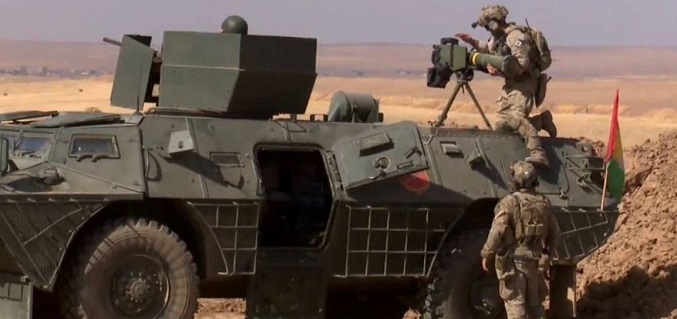Canadian troops are playing a part in the operation to retake Mosul from Daesh terrorists. But does their role involve being on the front line of the battlefield?
That’s the question that journalist are having a hard time getting a straight answer on from Defence Minister Harjit Sajjan.
Days following the October 17 assault on the northern Iraqi city by Iraqi and Peshmerga forces, photos have surfaced on social media showing what appear to be Canadian soldiers in uniform. There was also a photo in which Canadian soldiers appeared to be setting up heavy weapons. Accompanying captions and reports said they were participating in the offensive. It is believed that the photos were taken in an area east of Mosul where Peshmerga fighters were operating.
Photo’s of #Canadian soldiers actively participating in #Mosul battle #Iraq pic.twitter.com/idO7e5l8kr
— War Updates (@AnalaysingWar) October 25, 2016
#IRAQ: #Canada‘s #CANSOFCOM spotted near #Mosul. #Cdnpoli @CTVMercedes @Justin_Ling @BMakuch @DenisTherriault pic.twitter.com/ZiboUNDcbO
— The Sentinel (@TheSentinelCA) October 24, 2016
Canada is part of a global U.S.-led coalition battling Daesh, also called ISIS or ISIL.
A few months ago, some 200 Canadian soldiers have deployed to northern Iraq to train and advice Kurdish Peshmerga forces. The Canadian soldiers’ role was supposed to be non-combatant.
RELATED CONTENT
ISIS sleeper cells launch counter attack
Trudeau revamps Canada’s NATO mission
When asked about the photos during a conference call on Tuesday, Sajjan did not question the photos, according to a report from the Toronto Star.
“Our troops have all the necessary equipment to be able to apply the rules of engagement if necessary,” Sajjan said. “I want to make sure that our troops have the necessary equipment in place to mitigate any threat.”
He said the Canadian troops in Iraq now have anti-armour weapons.
Conservative MP James Bezan who was interviewed by the Star said the photos which appeared on Twitter Canadian soldiers “sighting targets with sniper rifles” and “painting targets” with lasers to mark them for air strikes by coalition forces.
Bezan criticized the Liberals for hiding “behind a curtain of secrecy” and demanded more transparency about the operation.
On Wednesday, Sajjan took part in the Counter-ISIL Small Group Defense Ministerial in Paris. The meeting, jointly chaired by France and the U.S., focused on the key contributors’ commitment to accelerate the campaign against the terrorist group. Members also discussed the needs of the region.
“We must, and will, defeat Daesh,” Sajjan said. “There is an ongoing need to be agile in our responses to stabilize Iraq. It is clear that the collective effort of Canada and its partners are having an impact on the ground.”
Under Operation Impact, the Canadian Armed Forces provide training and assistance to the Iraqi security forces, support the Coalition with highly skilled personnel, and provide support to Coalition air and intelligence efforts.
Canada is at the forefront of international efforts to defeat Daesh and to address the significant security, humanitarian, and political challenges it poses.
“Canada’s role in Iraq was mandated as non-combative, except in cases of self-defence. Although said to be in defence of themselves, civilians, or allied forces, Canadian troops have recently had to engage on multiple occasions in direct firefight with Daesh,” wrote Kelsie Chasse, program editor of the CAF program at the NATO Association Canada. “Canada’s increasing combative role is not surprising, as there has also been a shift in the Peshmerga and Iraqi Security Forces from defence to offence.”
In her recent article, Chasse said Canada has primarily been advising the Peshmerga fighters “however what began as classroom learning has evolved into active battle advice, now that the Mosul Offensive is underway…Canadian generals are there with them (though apparently not on the frontline), and are also in the Kurdish capital of Erbil, providing intelligence and advice to the advancing armies.”

